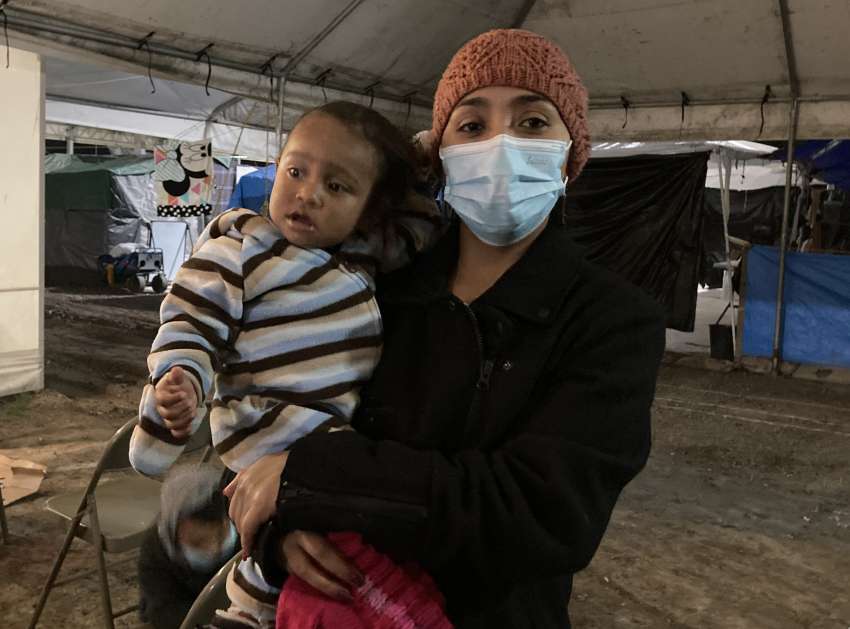After her children, ages 7 and 4, suffered an outbreak of sores, she sought out smugglers, who floated the children across the river in the dead of night to the U.S. side. The children promptly surrendered to immigration officials and were reunited with their father, who was already residing in the United States with an older son.
"It's difficult seeing your children suffer," Reyes recalled on a rainy night in the camp. "That's why I decided to send them across the river."
Despite the difficulties of remaining in the tent camp and desperately missing her children, Reyes spoke somewhat hopefully of being reunited with her family. She cited a simple reason: President Joe Biden, who promised an overhaul of U.S. immigration and asylum policies.
"We've had our hopes in Biden because he said that he was going to help us," Reyes said. "We hoped that he would win."
Reyes is stuck living in Matamoros — opposite Brownsville, Texas — as part of the Migrant Protection Protocols, which forces asylum-seekers to wait in Mexico as their cases are heard in U.S. courts. Biden has promised to scrap the protocols and announced new participants would not be enrolled after Jan. 21, though few people were being processed due to restrictions on entry implemented during the COVID-19 pandemic.
Details on what comes next for the asylum-seekers remains uncertain, and many still have U.S. court dates, which had been pushed repeatedly into the future during the pandemic.
Catholics working with program participants are urging them to remain patient. Some are encouraging the Biden administration to wind down the program, which they describe as "unjust" and designed to discourage asylum-seekers.
"(It) should be eliminated. It doesn't make sense for anyone," said Scalabrinian Fr. Pat Murphy, director of a migrant shelter in Tijuana. "An asylum process that is fair should be should started after so many years of injustice on the part of the Trump administration."
Despite the dearth of details, the prospect of an overhaul under a new U.S. administration has buoyed spirits among asylum-seekers stranded in unsafe Mexicans cities the length of the U.S.-Mexico border.
"Biden is their hope," said Juan Sierra, a lay volunteer with the Diocese of Matamoros' migrant ministry.
Adding to the expectations, he said: first lady Jill Biden visited the camp in December 2019 and served them lunch.
Sierra and the local diocese — along with volunteers, mostly from the United States — have attended to the camp, which once hosted an estimated 3,000 asylum-seekers. Its population has dwindled to roughly 700 as people found other housing, applied for asylum in Mexico, returned to their countries of origin or risked the Rio Grande, according to volunteers.
Residents said in interviews that criminal groups had infiltrated the camp and charge $500 for permission to cross the river. Migrant activists in other parts of the border report similar situations of criminal control and desperation among asylum-seekers.
"Many people, in their desperation, go to the river and try to cross. But many drown," said Dominican Br. Obed Cuellar, director of the diocesan shelter in Piedras Negras, opposite Eagle Pass, Texas.
Cuellar, two Franciscan sisters and a social worker have tried to assist asylum-seekers in Piedras Negras, but encountered resistance. The local government closed the diocesan migrant shelter early during the pandemic and later prohibited providing hot meals for takeout.
"It's an extremely difficult situation for the shelter because we're being prohibited from providing charity," he said.
For Cuellar, the situation reflected a broader trend in Mexico: local populations showing scant interest in the asylum-seekers' plight and broken promises from the federal government.
"The Mexican government has not fulfilled what it promised upon receiving the migrants here. They're not giving access to doctors, health care, not giving the work or giving them poorly paid work," he said.
Mexican President Andrés Manuel López Obrador has disputed claims of migrants being mistreated, saying in December: "We have respected migrants. There have been no violations of their human rights," according to the Associated Press.
Cuellar regularly checks in on the asylum-seekers, bringing food — when there are donations — and, during a cold week in January, blankets.
At a flophouse full of migrants and asylum-seekers, he fielded questions on the front patio, including one from a young Honduran woman, who asked about a "law" allowing children to be admitted, a rumour spread widely in Central America. Cuellar told them everyone was being sent back, including pregnant women, some of whom "wait until they are in labor to trying crossing." He urged them to wait until there is more clarity from the Biden administration.
Cuellar also checked in on a Honduran asylum-seeker, María Teresa Álvarez, who fled after gangsters killed her husband for not paying extortion and demanded her daughter be their girlfriend.
In Mexico, Álvarez was paying roughly $200 monthly for a dimly lit room — shared with her daughter and a son, 21 — and confessed security concerns as the police in Piedras Negras have a history of extorting migrants.
"I can go back to my country," she said, "but my daughter can't."
But with the change of government in the United States, she confessed: "I'm feeling a little hopeful. (Biden) says that he's going help people going through this process."
Sandro Hernández, 21, an Afro-Honduran, traveled to Mexico in a 2019 caravan and obtained a humanitarian visa to remain in Mexico legally for one year. He expressed optimism and some exasperation: Police detained him, he said, and stole 2,000 pesos ($126 Cdn).
Hernández had been working at a grocery store in the city of Saltillo, 200 miles south, but quit his job and headed for the border because of the prospect of migration policy changes under Biden.
"When I heard about Biden, I headed here," Hernández said outside a noisy dive bar, where he worked as a bouncer. "I'm looking for a better future. Hopefully, I can fix my paperwork, like the U.S. president is talking about."


